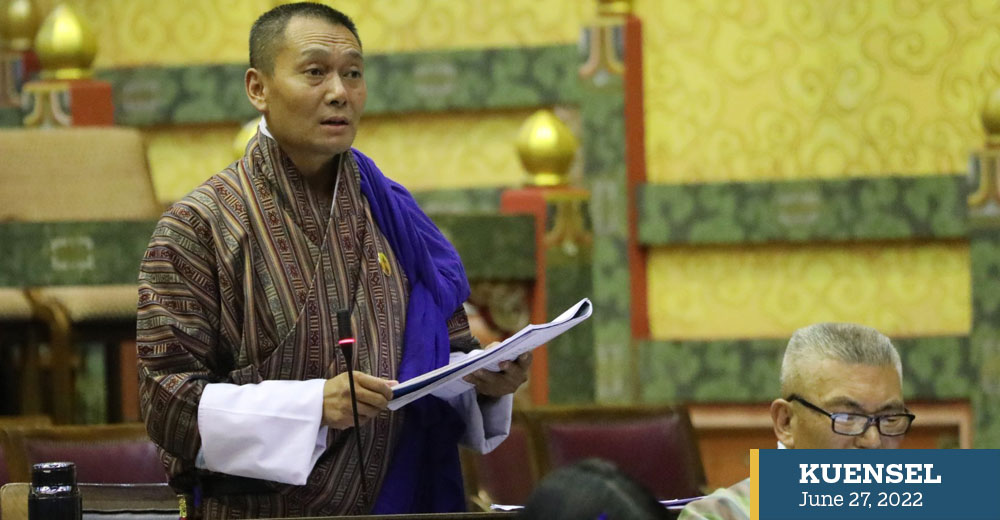Chhimi Dema
The National Assembly (NA) on June 24 adopted the Forest and Nature Conservation Bill of Bhutan 2021 with 38 ‘Yes’, and two “ No” votes and two abstained.
Chairperson of the Environment and Climate Change Committee, Gyem Dorji, said that the Act, which was enacted in 1995, was not amended for more than two decades.
“During these years, the forest department was guided by executive orders and notifications, which were incorporated into rules, regulations, and guidelines,” he said.
The Act, he added, contradicts the Constitution, the Penal Code, and legislations such as the Land, Mines and Minerals, and Water Acts.
“The amendment would give synchronicity to all these Acts,” Gyem Dorji said.
The Act allows the government to declare any protected area whereas Article 5 of the Constitution allows the Parliament to declare the area.
The Act overlap with the Mines and Mineral Management Act of Bhutan 1995 on the authority to regulate surface collection.
In the Bill, forest produce includes trees, timber, non-forest produce, wild animal, peat and soil whereas the Act included boulders, stones, sand, gravel, and rocks with are in the Mines and Minerals Act.
A statement report on the Act states that contradiction with the other laws has posed practical problems to the implementers and people. “Further, the field officials are also challenged for the want of clear procedural guidance to guide them during the implementation and enforcement process.”
The report states that the Act does not cover some of the forest protection and conservation aspects such as watershed management, private forest management, provisions on establishment and regulation of the wood-based industry, waste management in State reserved forest, and soil and water management.”
The Environment and Climate Change Committee of the House presented the Bill to the National Assembly on June 10 and made 134 recommendations.
The amendment allows the sustainable use and management of forests to benefit the people.
As per Section 119 of the Bill that the Ministry of Agriculture and Forests shall adopt and implement science, research, and technology-based innovation measures to prevent and mitigate human-wildlife conflict (HWC).
Additionally, Section 120 states that the government shall institutionalise appropriate measures with compensation to address damages caused by wildlife on people, property, crops, and livestock.
Gyem Dorji said that the ministry as prescribed by the rules had only a strategy to address HCW and that with the amendment of the Act, the ministry will institute appropriate measures to address HWC which will benefit the people.
Through the amendment, technology such as drones would be used to assess HWC.
The amendment of the Act instructs the government to compensate for farmers’ losses.
Setting some relaxation, the amendment of the Act states that laying of trap or snare may be allowed on the farmland to protect crops, livestock, private property and threat to human life.
The amendment of the Act does not allow timber allotment from any critical ecological sites, landslide-prone areas, risk of damaging roads and bridges, and significant landmarks and heritage sites.
Some sections that were repealed pertained to seizing and releasing livestock used for transportation of illegal forest produce; the allotment of timber from state reserved forest land; and confiscating any vehicle, equipment or machinery used in the commission of forest offence, among others.
The House also repealed the sections of the Bill that were already included in the Penal Code of Bhutan.
Going by Section 56 of the Bill, the Community Forest Management group members is limited to the use and management of trees and non-wood forest produce and shall have no ownership over the land, water resources, soil, sand, stone, boulder and riverbed materials in the Community Forest.
The Bill was passed to the National Council for deliberation.


